- Home
- Clarice Lispector
Complete Stories Page 9
Complete Stories Read online
Page 9
The orchestra, in gentle movements, nearly at a standstill, crouching, slips into a pianissimo “fox-blues” number, insinuating like a fugue.
A few couples leave intertwined.
I’ve been here so long, so long! Flora thinks and feels she ought to cry. That means I’m lost. She presses her hands to her forehead. What happens now? The waiter feels sorry for her and comes over to say she can wait as long as she likes. Thank you. She catches sight of herself in the mirror. But is that her over there? is that her, with the face of a scared rabbit, who’s thinking and waiting? (Whose little mouth is that? Whose little eyes are those? Yours, leave me alone.) If I don’t try to save myself, I’ll drown. Because if Cristiano doesn’t come, who will tell all these people I exist? And what if I, all of a sudden, shout for the waiter, ask for paper and pen and say: Dear sirs, I am going to write a poem! Cristiano, darling! I swear that Nenê and I are yours.
Look: Debussy was a musician-poet, but such a poet that just the title of one of his suites makes you lie down on the garden grass, arms beneath your head, and dream. Look: Bells through the leaves. Perfumes of the night . . . Look . . . a thin woman cried out at the next table, slapping the backs of her hands on the table, as if to say: “I assure you, now it’s evening. Don’t argue.”
“Nonsense, Margarida,” replied one of the men coldly, “nonsense. Come now musician-poet . . . Come now look . . .”
Flora would ask for a piece of paper and write:
“Silent trees
lost on the road.
Gentle refuge
of coolness and shadow.”
Cristiano won’t come. A man approaches. What is it?
“Huh?”
“I’m asking if you’d like to dance,” he continues. He blinks his nearsighted eyes in an idiotic and odd manner.
“Oh no . . . Really, no . . . I . . .”
He keeps looking at her.
“I, honestly, I can’t . . . Oh, maybe later . . . I’m waiting for a friend.”
He’s still standing there. What to do with this castoff? My God, my eyes.
“I can’t . . .”
“Please, madame, I get it,” the man says offended.
And he goes away. What exactly happened, after all? I don’t know, I don’t know. If I don’t look down, they’ll see my eyes. Silent trees lost on the road. Oh, surely I’m not crying because of that nearsighted man. Nor because of Cristiano who will never come again. It’s because of that sweet woman, it’s because Nenê is beautiful, beautiful, it’s because those flowers have a faraway perfume. Gentle refuge of coolness and shadow. “Dear sirs, now of all times, when I had so much to say, I don’t know how to express myself. I’m a solemn and serious woman, dear sirs. I have a daughter, dear sirs. I could be a good poet. I could have anyone I wanted. I know how to play every role, dear sirs. I could get up now and give a speech against humanity, against life. Asking the government to create a department of abandoned and sad women, who will never again have anything to do in the world. Asking for some urgent reform. But I cannot, dear sirs. And that’s the reason why there will never be any reforms. Because, instead of shouting, complaining, all I feel like is crying very softly and staying still, silent. Maybe not only because of that. My skirt is short and tight. I’m not getting up from here. To make up for it I have a small handkerchief, with red polka dots, and I can very well wipe my nose without the gentlemen, who don’t even know I exist, noticing.”
In the doorway appears a big man, newspapers in hand. He glances around looking for someone. That man comes straight toward Flora. He presses her hand, sits. He looks at her, his eyes shining, and in confusion she hears scattered words. “My pet, poor thing . . . the train . . . Nenê . . . darling . . .”
“Nonsense Margarida, nonsense,” says the man at the next table.
“Do you want anything?” Cristiano asks. “A soda?”
“Oh, no,” Flora jolts awake. The waiter smiles.
Cristiano, utterly happy, squeezes her knee lightly under the table. And Flora decides that never, ever again, will she forgive Cristiano for the humiliation she’s suffered. And what if he hadn’t come? Ah, then all that waiting would be excused, would mean something. But, like this? Never, never. Revolt, fight, yes do it. That Flora nobody knows must, appear, at last.
“Flora, I missed you so, so much.”
“My darling . . .” Flora says sweetly, forgetting her short tight skirt.
Letters to Hermengardo
(“Cartas a Hermengardo”)
first letter
My dear:
Just imagine how today I felt so happy that I started pacing around my room until my legs felt tired and my head went dizzy. Just imagine how it was raining and I thought of you. No, that’s not how I should tell it.
I’ll begin another way. As you know, I cannot complain of unhappiness, because thanks to the good Lord, I do not lack food when I need it and in the end I’ve got a bed to lie down on after a day when I’ve done my duty. Well then, my dear, my love, I am so ungrateful that sometimes having food and a bed doesn’t seem enough. Sometimes even the fact of being reasonably healthy and in possession of two legs that providence hasn’t wished to take away doesn’t seem enough. I know very well that it’s shameful and that’s why I’m confessing it.
As I was telling you, sometimes everything tastes like rubber and at those moments not even drinking coffee in bed can distract me. Everything suddenly gets old and I plead every second. Imagine, my dearest, how I come to ask myself: why work? why drink coffee in bed? why feel any pleasure? Imagine, darling, I, who ought to be constantly giving thanks for having been born with two sound eyes, or even, for having been born, imagine how this wretched creature that I am revolts against Creation! You can very well believe how much I curse myself after those moments. The worst is that when they settle in, they can be short but they can also be very long. And, sometimes, after several days of sin, I wake as if I’ve lost my memory. Either it’s the sun that I see for the first time, or it’s the air that I discover is so good to breathe. Naturally I don’t tell this to anyone because the other creatures are better than I and they do not doubt the joy of God.
You see, my dearest, I am even afraid of myself, in some moments. How bold of me to write this phrase: to doubt the joy of God. How far will I go, that’s what I ask myself. How far?
Well then, while it was raining, just today, I profaned against Creation with such a tortured heart and a soul that held so much fury that the goodness of those creatures couldn’t enter. I took my face out to the street, on a stretcher, showing it to everyone: cry for me, cry for me. And each time someone smiled, I’d scream: de-ath-de-ath-de-ath. I confess, rueful and repentant, that I got happy whenever it turned out well.
But today I came home early and in my room there was, as usual, no one, and I was alone with my nearly thirty-two years and I began to cry, feeling sorry for myself. I’ve tried everything, I assure you, to get better. I’ve repeated and repeated: may curses fall upon me, if I can’t be happy! No result. I’ve tried better methods: you’re nothing, what right do you have to be sad? Zero. Then I realized that I was sincere, though I didn’t understand why, in such a blissful world, I was crying.
And the worst is that I began to feel proud: do other people feel the way I do? I bet they don’t. You are seeing, my love, how one can arrive at such a degree of disgrace that she loves her own wound. Look, when I listen to music I feel happy, without even knowing why. Well then, I was suffering without even knowing why . . . (For shame, for shame! To speak of “suffering,” when there are people whom God punishes with his wrath, taking away their bread!)
My dear, my little white cat, that’s when you saved me. That’s why I paced around my room mad with joy, until I got tired. From my window I saw you leaning at yours. You didn’t look at me and indeed it seems that you still don’t know me. You brought the
last bit of a cigarette to your mouth, then stubbed it out carefully, tossed it away . . . and that was that. Nothing more. Yet I understood the message.
Forgive my egotism, I used your name so as not to follow the path of sin. I repeated, as in a prayer, kneeling at my bed: José. José. José. José. José. I said the same thing so many times that by the end your name had already changed into another, that I like more: Hermengardo. Hermengardo. Hermengardo. Hermengardo. Hermengardo . . . And afterward I said: I love you, I love you, I love you . . . And my love for mankind reconciled me with the world and with God.
I cannot be so proud as to think that the rain stopped because God wanted to bless my redemption. But I feel that’s the truth, there it is.
And that is why, my king, I kiss your hair and your hands. And I feel so thankful and happy that someday I may even send all the letters I’ve written to you.
The ever grateful and humble,
Idalina
second letter
Hermengardo, my dear:
Today I read a magazine article about “spleen.” In it they said this: that there was a woman who got so bored all day long, that she sometimes felt like leaving it all behind and going away, that she sometimes went shopping just for “something to do” despite having a thousand other important things to keep her busy. But José, this is basically what I have! I mean, even in the middle of the things I like best, I feel like leaving it all behind and going away! Only, I don’t see how “spleen,” that is, this word, resembles what I feel. What I feel is what I feel, end of story: it’s mixed in with me. And how can I possibly make myself into a word?
It’s like music. Sometimes I’m distracted in church, praying. And suddenly the bells begin to dance as if they were singing a wedding and my prayer grows strong, the saints glow, my soul is rejuvenated and I get so happy that I don’t even understand what I’m praying. Well then, I wanted to explain all this to Father Bernardo and it seemed like I was reading a laundry list. And that is why I say: what relationship is there between “spleen” and what I feel?
Ah. Hermengardo, my beloved, today I am as God wants me to be. Perfectly reminded that I have two healthy legs and two eyes to see the sun that He, the Great One, created. Everything else, all the rest, doesn’t matter, isn’t that so, my dear? once everything else seems like a laundry list, is precisely the moment we speak. Things were made to be said in the light of day and if one cannot say them it’s because they are of poor quality.
Therefore, I’ll hold onto my joy at having food and good health and my sorrow at having a headache. For all the rest, when it comes, I’ll say a prayer. And He, through your sweet name, Hermengardo, will save me and show me the path down which a woman may walk.
So take another fraternal kiss, on the left cheek, there where you have a little black mark.
Thankful that you exist, humbly,
Idalina
third letter
José:
Yesterday I missed you. I had come home from the office and needed to pray. Because, mea culpa, I keep wanting the fog, when right beside it the clear air stretches on gloriously. Because mea culpa, I go on full of things that weren’t made to be said in the light of day.
So I knelt and prayed your name.
At first, everything was going well. But suddenly the neighbor’s radio announced “The Pines of Rome,” by Respighi. I listened, rapt. The music was like the pines, pointing toward the heavens, slim and solitary and lovely, ah, so lovely . . . But, Hermengardo, the pines were suffering . . . Why, Hermengardo? Why? Weren’t they pointing toward the heavens? Weren’t they like pure life? Why then were they singing a lament and why were they hurting my heart? And it was so magnificent so terrible…
Everything grew dim, the whole prayer shattered. I wanted to say Hermengardo and could only say José . . . I wanted to recall my legs, but I was recalling the pines, so perfect and so painful…
I prayed, aloud, nearly shouting. But I could only say: José, José, as if reading the laundry list…
What I mean is that evil invaded me and flooded all my clear paths. Not even you, not even your name will save me now. But I have faith in Him and in his absolute comprehension. On Judgment Day I shall sing the song of the pines of Rome before God. Wordlessly, and thus shall I bring Him the secret, whole and pure, so as to receive an explanation. And so much will He understand me, that he won’t use words: he will sing another song.
Ever poorer before Him.
Idalina
fourth LETTER
My dear Hermengardo:
Today is Sunday and the city is lovely. There is no one on the streets and all the trees exist solitary and sovereign. The worries and desires and hatreds have dwindled, stretched out upon the earth, tired of existing. And at the level of my mouth all I find is the sweet, pure air of calm renunciation.
My soul, cowering all week long, feels sudden desires to sprawl out, to feel supple for a few moments, to be colored afterward with a lassitude as happy as the kind that today softens nature. I need to think for a few minutes so as to possess sweet repose thereafter.
That is why I shall speak of the passions. And I know that you will listen because I have already transmitted to you the impression and desire of Sunday. And because I tell you that I shall speak in the humble robes of a shepherd. And that makes me small and reconciles me to you.
I would like to tell you that having passions does not mean living beautifully, but rather suffering pointlessly. That the soul was made to be guided by reason and that no one can be happy when at the mercy of the instincts. For we are animals yet we are animals disturbed by man. And if they forgive him, he is proud and demanding and never forgives their excesses.
I speak to you of the passions in terms of their quality and their effects.
In terms of their quality because whereas the body is active, the soul is contemplative by nature and, knowing nothing, contemplates so as to conclude. That is its function. And in terms of its effects, because the bow feels empty after bidding farewell to the arrow.
I tell you that there is a joy in renouncing the pain of the passions. Because to desire them is to desire pain and not contentment and those who are noble feel in themselves the necessity to sound out their capacity to burn. And I tell you that what matters is not burning ardently, what matters is repose. What matters is coming to understand oneself and life through reason, which distinguishes us from animals.
And if one day I spoke to you of “noble passions,” I did not call them noble due to their nature, nor their consequences, except out of compassion for their source, the eternal void of men. Because the man disturbed by pride seeks passion as a form of finding humility. He senses (and woe to the blind) that later on humility will come and in humility lies the serenity of the flower that allows itself to sway in the breath of the breeze.
There is that hero, a man without substance who desires, in a fever, to find calm. He should not be applauded, but lamented. There is another hero, who desires only upheaval. And he is a man who could not help but go back. He is a weak man. But if you wish to call him noble, you may. Because there is also a great beauty in animals. And in any case, all that exists is beautiful, error as much as truth. It just so happens that this approach to finding beauty is the approach of one who looks down at earth from heaven and is moved by the frailties of his sons. Men, however, struggle a great deal and desire a great deal. They have no time to seek the whole. They want individual happiness.
And that is why I tell you: passion is not the way.
There exists another way, the only one.
We have reached a certain degree of consciousness of our intelligence and, knowing this to be our mark as men, have discovered that we should give our strength to it so as to attain human perfection. And by this I do not mean to say that we should stop being animals. Never shall we renounce this happiness. What we should seek is
for this primitive state to rise a bit and for our pride in being rational to fall a bit until the two beings that exist in us can meet, absorb one another and form a new species in nature.
And that is why I tell you: abandon whatever destroys. Passion destroys because it dissociates. Passion arises in the body and, not comprehending it, we situate it in our souls and become disturbed.
I am explaining all this to you so that you never exalt anything that wars with the contented spirit and anything that kills itself out of love. Merely forgive them. They have yet to comprehend that in life the smile exists and that passion destroys it and transforms it into a trembling rictus, which is no longer human.
If you cannot free yourself from desiring passions, read novels and adventure stories, for that is also why writers exist.
And another thing: pass on what I have said to you to some youth who cannot sleep at night, dreaming up new adventures for Don Quixote. Explain to him that the “ever after” of passion tastes like a stubbed-out cigarette. Ask him, on my behalf, to be a man and not a hero, because nature demands nothing of him except that he be happy and find the peace of the open glade down less painful paths.
Explain this to him and I shall be able to rest this Sunday with the necessary humility.
Now if you ask me: “How do you know these things?” I shall answer in the words of Kipling, so often quoted by my Public Law professor: “But that’s another story . . .”
Thank you for listening to me,
Idalina
fifth LETTER
My dear Hermengardo,
In truth I tell you: happily you exist. For me the existence of a creature on Earth is enough to satisfy my desire for glory, which is nothing but a profound desire for closeness. Because I was mistaken when long ago I imagined as real my former yearning to “save humanity,” “malgré,” itself. Now all I desire is another person, besides myself, to whom I can prove myself . . . And by returning to Idalina I also understood how beautiful and how impossible that other dream is, that of trying to save oneself. And if it is so impossible, then why lead me to this new citadel that would now be a poor disturbed woman? I don’t know. Perhaps because one must save something. Perhaps through the belated consciousness that we are the sole presence that will not leave us until death. And that is why we love and seek ourselves. And why, so long as we exist, the world shall exist and humanity shall exist. This is how, in the end, we are connected to them.

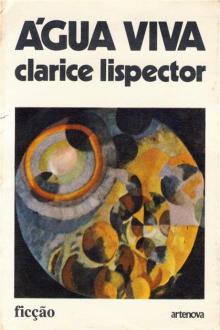 The Stream of Life
The Stream of Life The Complete Stories
The Complete Stories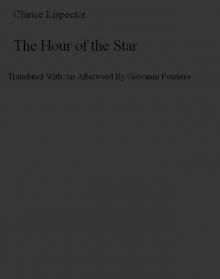 The Hour of the Star
The Hour of the Star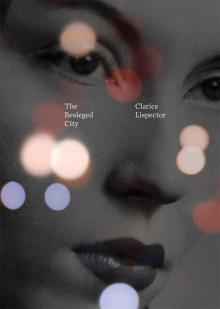 The Besieged City
The Besieged City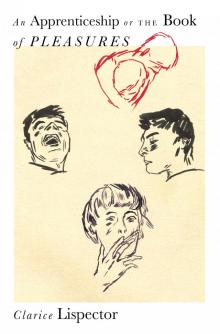 An Apprenticeship or the Book of Pleasures
An Apprenticeship or the Book of Pleasures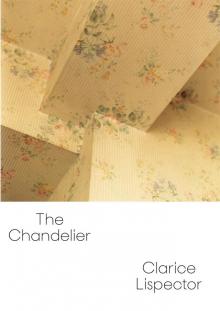 The Chandelier
The Chandelier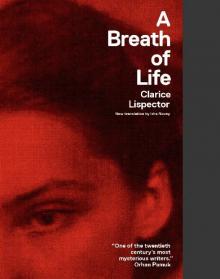 A Breath of Life
A Breath of Life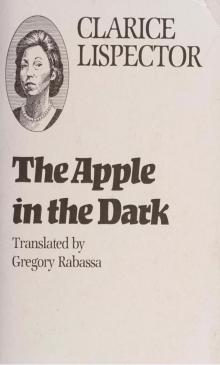 The Apple in the Dark
The Apple in the Dark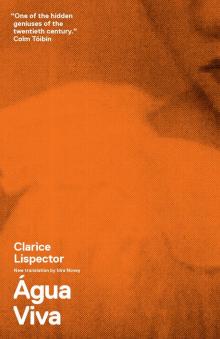 Agua Viva
Agua Viva Complete Stories
Complete Stories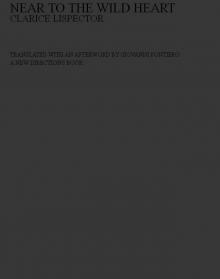 Near to the Wild Heart
Near to the Wild Heart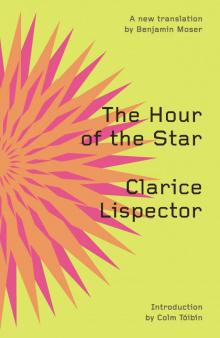 The Hour of the Star ()
The Hour of the Star ()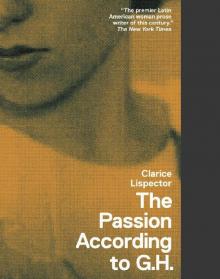 The Passion According to G.H.
The Passion According to G.H.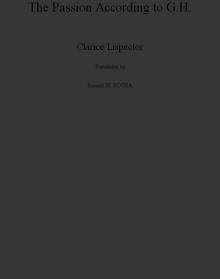 The Passion According to GH
The Passion According to GH